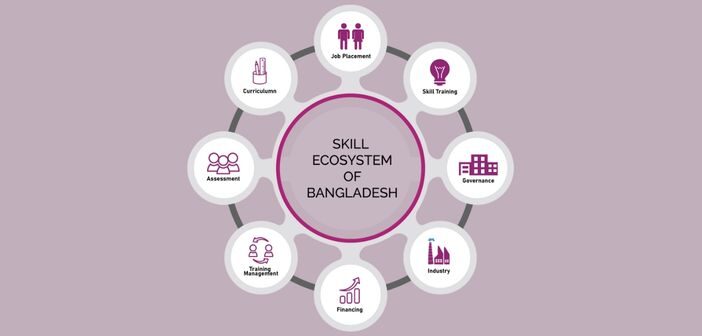Guest Author – Khan Mohammad Mahmud Hasan, TVET Expert, Bangladesh

Bangladesh is making significant efforts to create a highly trained labour force. The country’s expanding economy has led to widespread recognition of the need to increase spending on human capital.
Technical and Vocational Education and Training (TVET) programs, trade associations, and foreign alliances are just some of the tools Bangladesh has deployed to foster professional growth and development. This article will give you a glimpse of Bangladesh’s current skill ecosystem and the country’s difficulties in creating a fully functional system.
Government Initiatives in Bangladesh
Bangladesh’s only TVET governance agency is the Ministry of Education’s Technical and Madrasah Education Division (TMED). To meet society’s needs and the 21st-century labour market, TMED must pass laws and policies. TMED includes technical and Madrasah education. Technical education offers certificates, diplomas, and short-term occupational training.
The government funds infrastructure, trainers, and curriculum to train mostly unemployed individuals for local and international skilled labour demand. The Skills for Employment Investment Program and Accelerating and Strengthening Skills for Economic Transformation (ASSET) have huge budgets. Those projects trained thousands in hundreds of challenging trades. Project data shows that over 50% work in local and foreign sectors.

The Bangladesh National Qualifications Framework (BNQF) categorizes and acknowledges skills, knowledge, and competencies across ten qualification levels in elementary and secondary schools, colleges and universities, and mosques. The BNQF’s ten qualification levels are uniform, giving clear starting and ending points and growth opportunities. This streamlines education and training to promote lifelong learning and employment. This architecture supports robust ecosystem participants.
Industry Skills Council (ISC) handles government-industry relations. Industry Skills Councils (ISCs) bring together industry leaders to discuss skill development concerns.
Private Sector Associations in Bangladesh Skill Ecosystem
The private sector is one of the major builders of Bangladesh’s skill ecosystem. Several associations play a significant role in skill development with the collaboration of Government and local and International NGOs. For example, the Bangladesh Association of Software and Information Services matters (BASIS) encourages and trains Bangladeshi IT professionals.
Bangladesh’s skill ecosystem is supported by private organizations like Standard Chartered Bank and GrameenPhone, which subsidize training. UNDP and GrameenPhone fund FutureNation. Through these programs, students learn new skills for the future. The skill ecosystem of Bangladesh (SEB), founded by Axis Meta, is a program that analyzes the existing system and fills the gaps with new activities.
Bangladesh’s International Partnerships
Bangladesh has partnered with international organizations to enhance the skills ecosystem in the country. The ADB has funded and assisted various Bangladeshi skill development projects. Construction, tourism, and ICT TVET programs have received ADB financing.
Bangladesh also partnered with the International Labour Organization (ILO). Entrepreneurship and vocational training initiatives have received technical help and money from the ILO. The ILO has sponsored apprenticeship programs to give workers hands-on training.
It may also interest you to read – Colombo Plan Staff College (CPSC): Enhancing global competitiveness of TVET
Bangladesh’s TVET Institutes
Various types of TVET institutes provide different types of training. Some provide long-duration Diplomas like Polytechnics; some provide short training like Technical Training Colleges (TTC), and Technical School and College (TSC). Some NGO-operated training like UCEP and Muslim Aid provides training to unprivileged people.
Challenges in Bangladesh’s skill ecosystem
Bangladesh’s skill ecosystem faces many hurdles despite growth –
- Stakeholder cooperation – Stakeholder cooperation is a significant issue. Skill development programs need greater coordination across government agencies, private sector groups, and international alliances to be effective and efficient.
- Trainers/ instructors – Bangladeshi training institutes need help hiring qualified instructors for high-quality programs. Education is scarce in developing industries like renewable energy and digital marketing.
- Industry-academia collaboration – Industry-academia collaboration is another issue. Many Bangladeshi training colleges rarely work with the industries they prepare for. Workers may need more skills than firms need. Training colleges and enterprises must collaborate to satisfy employer needs.
- Training for emerging industry sectors – Finally, emerging industries need specific training. As Bangladesh’s economy diversifies, renewable energy, e-commerce, and fintech necessitate skilled workers. These industries’ specific talents are rarely trained. Developing sectors need more specialized training.
The Way Forward
Various methods can strengthen Bangladesh’s skill ecosystem. First, stakeholders must cooperate. A national agency can manage skill development, that optimizes resources and activities with government, commercial, and international partners.
Second, qualified trainers are needed. Industry can help training institutes identify essential skills and establish programs. Bangladesh needs incentives for qualified trainers.
Training institutes and businesses must collaborate. Industry-academia alliances with training institutes can customize training programs for employers. Apprenticeships and internships will be helpful in providing practical experience.
Finally, developing industries need more specialized training. Partnerships with industry experts and international organizations can accomplish this. These partners can help training institutes create industry-specific curricula.
Government agencies, private sector organizations, and foreign partnerships have improved Bangladesh’s skill ecosystem. However, stakeholders need coordination, skilled trainers are scarce, industry-academia collaboration is lacking, and rising industries need more specialized training programs. With the appropriate approach, Bangladesh can train a qualified workforce to support its booming economy.














Comments 1